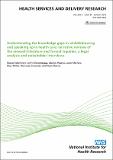Files in this item
Understanding the knowledge gaps in whistleblowing and speaking up in health care : narrative reviews of the research literature and formal inquiries, a legal analysis and stakeholder interviews
Item metadata
| dc.contributor.author | Mannion, Russell | |
| dc.contributor.author | Blenkinsopp, John | |
| dc.contributor.author | Powell, Martin | |
| dc.contributor.author | Mchale, Jean | |
| dc.contributor.author | Millar, Ross | |
| dc.contributor.author | Snowden, Nicholas | |
| dc.contributor.author | Davies, Huw | |
| dc.date.accessioned | 2018-09-06T14:30:05Z | |
| dc.date.available | 2018-09-06T14:30:05Z | |
| dc.date.issued | 2018-08-28 | |
| dc.identifier | 255749178 | |
| dc.identifier | c392242e-58cf-4f76-b449-11b515441c79 | |
| dc.identifier.citation | Mannion , R , Blenkinsopp , J , Powell , M , Mchale , J , Millar , R , Snowden , N & Davies , H 2018 , ' Understanding the knowledge gaps in whistleblowing and speaking up in health care : narrative reviews of the research literature and formal inquiries, a legal analysis and stakeholder interviews ' , Health Services and Delivery Research , vol. 6 , no. 30 , pp. 1-190 . https://doi.org/10.3310/hsdr06300 | en |
| dc.identifier.issn | 2050-4349 | |
| dc.identifier.other | crossref: 10.3310/hsdr06300 | |
| dc.identifier.other | ORCID: /0000-0002-2653-3695/work/57821553 | |
| dc.identifier.uri | https://hdl.handle.net/10023/15981 | |
| dc.description | Funding: The National Institute for Health Research Health Services and Delivery Research programme. | en |
| dc.description.abstract | Background: There is compelling evidence to suggest that some (or even many) NHS staff feel unable to speak up, and that even when they do, their organisation may respond inappropriately. Objectives: The specific project objectives were (1) to explore the academic and grey literature on whistleblowing and related concepts, identifying the key theoretical frameworks that can inform an understanding of whistleblowing; (2) to synthesise the empirical evidence about the processes that facilitate or impede employees raising concerns; (3) to examine the legal framework(s) underpinning whistleblowing; (4) to distil the lessons for whistleblowing policies from the findings of Inquiries into failings of NHS care; (5) to ascertain the views of stakeholders about the development of whistleblowing policies; and (6) to develop practical guidance for future policy-making in this area. Methods: The study comprised four distinct but interlocking strands: (1) a series of narrative literature reviews, (2) an analysis of the legal issues related to whistleblowing, (3) a review of formal Inquiries related to previous failings of NHS care and (4) interviews with key informants. Results: Policy prescriptions often conceive the issue of raising concerns as a simple choice between deciding to ‘blow the whistle’ and remaining silent. Yet research suggests that health-care professionals may raise concerns internally within the organisation in more informal ways before utilising whistleblowing processes. Potential areas for development here include the oversight of whistleblowing from an independent agency; early-stage protection for whistleblowers; an examination of the role of incentives in encouraging whistleblowing; and improvements to criminal law to protect whistleblowers. Perhaps surprisingly, there is little discussion of, or recommendations concerning, whistleblowing across the previous NHS Inquiry reports. Limitations: Although every effort was made to capture all relevant papers and documents in the various reviews using comprehensive search strategies, some may have been missed as indexing in this area is challenging. We interviewed only a small number of people in the key informant interviews, and our findings may have been different if we had included a larger sample or informants with different roles and responsibilities. Conclusions: Current policy prescriptions that seek to develop better whistleblowing policies and nurture open reporting cultures are in need of more evidence. Although we set out a wide range of issues, it is beyond our remit to convert these concerns into specific recommendations: that is a process that needs to be led from elsewhere, and in partnership with the service. There is also still much to learn regarding this important area of health policy, and we have highlighted a number of important gaps in knowledge that are in need of more sustained research. Future work: A key area for future research is to explore whistleblowing as an unfolding, situated and interactional process and not just a one-off act by an identifiable whistleblower. In particular, we need more evidence and insights into the tendency for senior managers not to hear, accept or act on concerns about care raised by employees. | |
| dc.format.extent | 1735204 | |
| dc.language.iso | eng | |
| dc.relation.ispartof | Health Services and Delivery Research | en |
| dc.subject | RA0421 Public health. Hygiene. Preventive Medicine | en |
| dc.subject | E-DAS | en |
| dc.subject | SDG 3 - Good Health and Well-being | en |
| dc.subject | SDG 16 - Peace, Justice and Strong Institutions | en |
| dc.subject.lcc | RA0421 | en |
| dc.title | Understanding the knowledge gaps in whistleblowing and speaking up in health care : narrative reviews of the research literature and formal inquiries, a legal analysis and stakeholder interviews | en |
| dc.type | Journal article | en |
| dc.contributor.institution | University of St Andrews. School of Management | en |
| dc.identifier.doi | https://doi.org/10.3310/hsdr06300 | |
| dc.description.status | Peer reviewed | en |
This item appears in the following Collection(s)
Items in the St Andrews Research Repository are protected by copyright, with all rights reserved, unless otherwise indicated.

